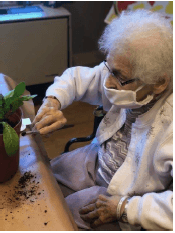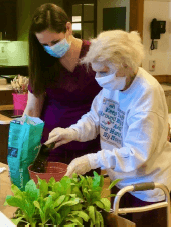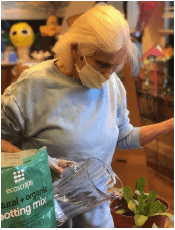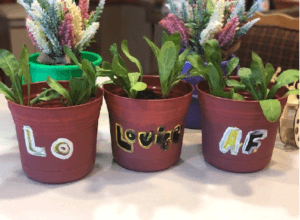

Working in long-term care during a pandemic poses a unique set of challenges for therapists, from wearing PPE all day to providing only in-room treatments. Patients, however, face their own set of problems. Visitor restrictions and the cancellation of group activities increases social isolation and depression. As therapists, it is our job to treat all patients needs, mental, physical, and spiritual. As a result the AdvantageCare staff at Baptist Homes decided to provide in-room treatments that were not only functional, but patient-centered, in order to meet patients’ therapy goals and improve their spirits.
During the start of the Covid-19 lock down, many patients voiced that they missed their favorite spring activity, gardening. “We had flowers all the time up Conneaut Lake. We would sit out and look at them,” stated Lois Ott. Ann Fischetti stated, “I used to plant flowers at home- marigolds and impatiens.” The therapists at Baptist Homes decided to bring this outdoor IADL inside, in order to improve their dynamic standing balance for toileting and lower body dressing. As a result, the therapists had them stand to re-plant marigolds in pots and water them. This task challenged their ability to reach outside of their base of support without the use of their hands to steady themselves. Louise Altares had a goal to improve her fine motor coordination for ADL tasks including completing clothing fasteners during dressing tasks. As a result, she was challenged to utilize her impaired hand to scoop dirt and paint her name on her flower pot. Louise stated, “I love flowers. I always make sure I get them for my room.”
Gardening during therapy sessions not only helped to improve patients’ balance and fine motor coordination, but also helped to improve morale. Patients were able to meet their therapy goals by doing something they enjoyed. while they were in their rooms, they had flowers to look at and reminisce about fond memories at the lake or planting in their garden. Potted plants also added watering to their daily routine, giving them a purpose and activity to pass the time. “This is fun,” stated Louise, “Therapy helps a lot. It keeps me moving.” “I can’t wait to tell my kids I planted today!” exclaimed Anne. Although providing in-room treatments can seem repetitive, a little creativity can help improve patient outcomes and spirit.
Nicole Strauch, OTR/L
Baptist Homes




